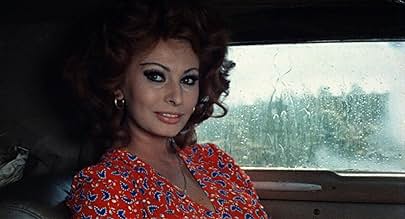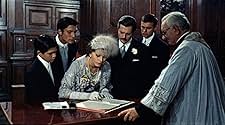IMDb RATING
7.4/10
12K
YOUR RATING
Wealthy businessman Domenico and penniless prostitute Filumena share a large part of their lives in post-WWII Italy.Wealthy businessman Domenico and penniless prostitute Filumena share a large part of their lives in post-WWII Italy.Wealthy businessman Domenico and penniless prostitute Filumena share a large part of their lives in post-WWII Italy.
- Nominated for 2 Oscars
- 7 wins & 10 nominations total
Marilù Tolo
- Diana
- (as Marilu' Tolo)
Alberto Castaldi
- Doctor
- (as Alberto Gastaldi)
Vincenzo Aita
- Alfonso - Priest
- (uncredited)
Featured reviews
Absolute classic romantic comedy with two of the absolute greats in Marcello Mastroianni and Sophia Loren. The romance is stunningly powerful, the comedy is witty and hilarious.
"The more the world changes, the more it stays the same."
Marriage Italian Style is a beautiful love story between Sophia Loren and Marcello Mastroianni, that created electricity when they worked together. Passionate chemistry and amazing acting. A difficult story, which makes you question good and bad, right and wrong. It's a "problem play" which ends up happy, but not happy. You wonder what the future will bring, but hope for the best. Sophia Loren and Marcello Mastroianni could not be better matched or more compelling to watch. Overall, I've seen Marriage Italian Style many times and love it more every time.
Marriage Italian Style is a beautiful love story between Sophia Loren and Marcello Mastroianni, that created electricity when they worked together. Passionate chemistry and amazing acting. A difficult story, which makes you question good and bad, right and wrong. It's a "problem play" which ends up happy, but not happy. You wonder what the future will bring, but hope for the best. Sophia Loren and Marcello Mastroianni could not be better matched or more compelling to watch. Overall, I've seen Marriage Italian Style many times and love it more every time.
A fine showcase for Sophia Loren who at the age of thirty portrays and older women seemingly at death's door as well as a young girl of seventeen. And throughout she has a fantastic rapport with Marcello Mastroianni and however fantastical becomes the action, however unrealistic the Italian 'realism' we believe in her. She is not, if there is such a thing, a 'classic' beauty and yet she always looks lovely. Her face can express sadness, concern, happiness and glee, all within seconds of each other and with her all the time remaining attractive. Her body is probably even more remarkable but it is the way she can move that is truly magical, and sexy. She can striptese all day long but the magic is when she begins to walk or skip along the street. Remarkable. And on the screen, of course, quite magical. So if the first half of this Vittorio De Sica film can be sluggish with comedic moments that don't quite cut it today (if they ever did outside of Italy) there is always Loren to look at and the pairing of the two to enjoy. Things get going and if we find it hard to glorify prostitution one moment and femininity and motherhood the next, it is not a problem for the Italians and eventually we too are swept along in a romanticised wave of well being.
MARRIAGE Italian STYLE is a glossy rendition of Eduardo De Filippo's Neapolitan play "Filumena Marturano", which he himself had made into a film in 1951. In this 1964 version Sophia Loren and Marcello Mastroianni take the roles previously played by Eduardo and Titina De Filippo. The story deals with the long love affair between a wealthy, arrogant and selfish Neapolitan businessman (Marcello Mastroianni) and the seemingly ignorant ex-prostitute (Loren) who attempts to trick him into marriage by pretending to be dying and then bouncing back to life. She does all this because she wants to guarantee a better life for her three semi-secret children. One of her children is his, she tells him. Which one, she will never say.
To say that Mastroianni and Loren had on-screen chemistry is an enormous understatement. They are both as marvelous together here as is other films together, most notably YESTERDAY, TODAY, AND TOMORROW and A SPECIAL DAY. For me one of the best moments in the film is Loren's walk down a sidewalk in Naples where the men and boys alike gape at her. That always knocks me out. Loren walks marvelously there and does a magnificent acting job elsewhere in this engaging dramatic farce. The film was directed by Vittorio De Sica, who had directed Loren's Academy Award performance in TWO WOMEN (LA CIOCIARA). It is among her most notable roles ever, along with TWO WOMEN, A SPECIAL DAY, THE BLACK ORCHID, and Lina Wertmüller's Saturday, Sunday, AND Monday.
To say that Mastroianni and Loren had on-screen chemistry is an enormous understatement. They are both as marvelous together here as is other films together, most notably YESTERDAY, TODAY, AND TOMORROW and A SPECIAL DAY. For me one of the best moments in the film is Loren's walk down a sidewalk in Naples where the men and boys alike gape at her. That always knocks me out. Loren walks marvelously there and does a magnificent acting job elsewhere in this engaging dramatic farce. The film was directed by Vittorio De Sica, who had directed Loren's Academy Award performance in TWO WOMEN (LA CIOCIARA). It is among her most notable roles ever, along with TWO WOMEN, A SPECIAL DAY, THE BLACK ORCHID, and Lina Wertmüller's Saturday, Sunday, AND Monday.
After anthologies "Boccaccio 70" and "Yesterday, Today and Tomorrow," director Vittorio De Sica returns to a single story format with his favorite actress Sophia Loren, joined yet again by Marcello Mastroianni, evoking memories of her Oscar-winning turn in "Two Women" as Filumena, devoted companion to Mastroianni's wealthy Domenico, who discovered her as a frightened 17 year old in a bordello during a wartime bomb raid, putting her to work as a domestic in his mother's home rather than waste his position in society on a woman below his station. 20 years pass and she now lies on her deathbed, requesting the presence of a priest who promptly joins the two in marriage (just as he's prepared to wed a girl half his age), Domenico stunned to see Filumena up in no time and fighting fit, and more determined than ever to emerge the victor in this battle of the sexes, not so much for herself but for the three sons she has secretly cared for over the years. There are amusing moments to be sure but it's by heart a serious drama in which Sophia effortlessly ages from bubbly coquette to middle aged dowager over 100 minutes yet still meets her perfect match in Marcello Mastroianni, who has no business being so likable when he's essentially portraying a cad.
The film employs a tremendously perky rhythm and register to showcase the traits of the earthly Italy at its post-war development, even though essentially the overwrought kernel of a prostitute's tribulations could hardly appropriate as a comedy material.
Vittorio De Sica's camera enigmatically haunts and pivots around two leads' present and past, the intangible love/hate chaos is disarmingly intriguing and subconsciously imbues the audience with a fervent compassion towards Sophia Loren's unswerving while passionate Filumena. The leading performance is worth of much accolade, especially for Sophia Loren, whose full-brown force of personality spanning over 20 years in the film and indisputably devotes a magnificent performance with all her zest and vigor. Marcello Mastroianni, is great as well, to hone up his versatility and render the womanizer an ambiguous moral criterion which is a more delicate task.
I cannot help being fascinated by the exquisite script as well, credited by five names, no wonder all the twists and turns are so fruitful in a way that both surprising and amusing. Nominated for 2 Oscars (BEST FOREIGN FILM and a second BEST ACTRESS nomination for Loren) and is a milestone which not only represents Loren's heyday but also is a comforting fruition of Loren-Conti correlation. Maybe it is not director De Sica's best canon due to its slight superficiality of machismo, which I sense may not be the director's fault as it is a general bias lies in all over the globe. Anyway, the film itself surely is a fine piece captures a genuine Italian aura (the Naples' style) and definitely worth your pocket.
Vittorio De Sica's camera enigmatically haunts and pivots around two leads' present and past, the intangible love/hate chaos is disarmingly intriguing and subconsciously imbues the audience with a fervent compassion towards Sophia Loren's unswerving while passionate Filumena. The leading performance is worth of much accolade, especially for Sophia Loren, whose full-brown force of personality spanning over 20 years in the film and indisputably devotes a magnificent performance with all her zest and vigor. Marcello Mastroianni, is great as well, to hone up his versatility and render the womanizer an ambiguous moral criterion which is a more delicate task.
I cannot help being fascinated by the exquisite script as well, credited by five names, no wonder all the twists and turns are so fruitful in a way that both surprising and amusing. Nominated for 2 Oscars (BEST FOREIGN FILM and a second BEST ACTRESS nomination for Loren) and is a milestone which not only represents Loren's heyday but also is a comforting fruition of Loren-Conti correlation. Maybe it is not director De Sica's best canon due to its slight superficiality of machismo, which I sense may not be the director's fault as it is a general bias lies in all over the globe. Anyway, the film itself surely is a fine piece captures a genuine Italian aura (the Naples' style) and definitely worth your pocket.
Did you know
- TriviaDomenico arranges an apartment in Naples for Filumena. The former tenant's belongings are still in. There is a picture of Clara Petacci (dictator Mussolini's mistress) on the wall and Filumena asks when this will be removed. The scene is set in the late 1940s, so this obviously symbolizes Italy's transition from fascism to a republic. Mussolini himself would probably not have passed the censors.
- Quotes
Filumena Marturano: [subtitled version] The problem is that our hearts used to be so big...
[holds up pebble]
Filumena Marturano: and now look how small they are.
- ConnectionsEdited into Marcello, una vita dolce (2006)
- SoundtracksMunasterio 'e Santa Chiara
(uncredited)
Written by Michele Galdieri and Alberto Barberis
Sung by Don Domenico on the trip home from the racecourse; Don Domencio also asks the boys to sing it
- How long is Marriage Italian Style?Powered by Alexa
Details
Box office
- Gross US & Canada
- $10,600
- Opening weekend US & Canada
- $4,967
- Sep 25, 2011
- Gross worldwide
- $206,875
- Runtime1 hour 42 minutes
- Sound mix
- Aspect ratio
- 1.85 : 1
Contribute to this page
Suggest an edit or add missing content






























